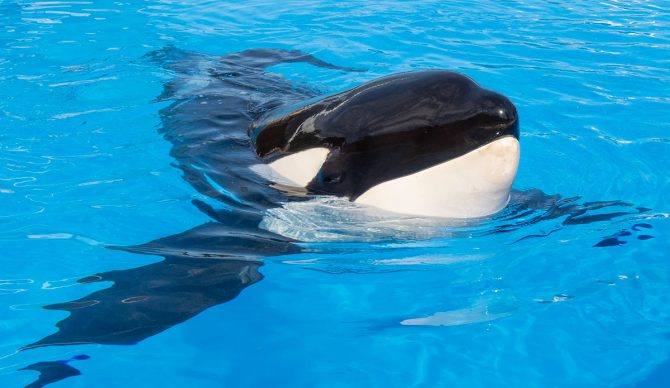
Keto, an orca whale who spent his life in tanks, has died. Photo: Loro Parque//Facebook
Keto, an orca who spent his entire his life on display for our entertainment, has died. The news of his passing was shared by Loro Parque in Tenerife, where Keto lived for the last 18 years of his life in the Canary Islands.
“With sadness in our hearts, we share the heartbreaking news about the passing of Keto, our beloved 29-year-old male orca,” Loro Parque wrote on Facebook. “Since 2006, Keto was an extraordinary ambassador for his species, captivating everyone with his majestic presence and unique personality. His departure leaves an irreplaceable void in our hearts and throughout our entire team.”
Like most captive orcas, Keto did not have a good life. He was born in Orlando, Florida in 1995 at SeaWorld. His mother, the first captive born orca, was named Kalina and his father Kotar was captured off the coast of Iceland in 1978. When Keto was almost five, he was moved to SeaWorld San Diego before moving again to the now-shuttered SeaWorld park in Ohio. Then, a few years later, he was moved once again to San Antonio, Texas. By the time he was six, he had lived in all of SeaWorld’s “orca stadiums.”
After five more years in Texas, he and three other orcas were flown to the Canary Islands, where he would live out the rest of his life in a tank. According to the Dolphin Project, a non-profit charitable organization dedicated to the welfare and protection of dolphins worldwide, Keto performed daily at Loro Parque.
“Over the years, Loro Parque has presented Keto to the audience as an ambassador of his species even though he has never seen the ocean or experienced anything that is natural to an orca,” the Dolphin Project wrote. “He never even saw a real ocean wave and could only swim a few feet before a wall stopped him. Day in and day out crowds of spectators laughed and applauded at the tricks he performed.”
On November 20, Loro Parque shared an update on Keto’s declining health. “Our beloved Keto Orca, who has been part of our family for nearly 30 years, has been going through a difficult health moment for several weeks. We are deeply concerned, and we know that those who love and follow our animals will share this sentiment,” park employees wrote. “Our dedicated veterinary specialists, along with an international team of experts and the caregivers who know and care for Keto day in and day out, are putting all their effort and heart into giving you the best chance at recovery.”
Although there has never been a recorded instance of an orca killing a human in the wild, there are numerous tragic tales of captive killer whales killing people. Keto is one of those tales. On Christmas Eve, 2009, Keto attacked and killed his trainer. Unlike many other high-profile orca attacks, Keto’s went under the radar and he continued to perform.
Keto’s sad life and death is yet another reminder that orcas — and all cetaceans, for that matter — probably don’t belong in tanks. It’s a complicated subject, however, especially for captive-born whales who likely wouldn’t survive living in the wild.

